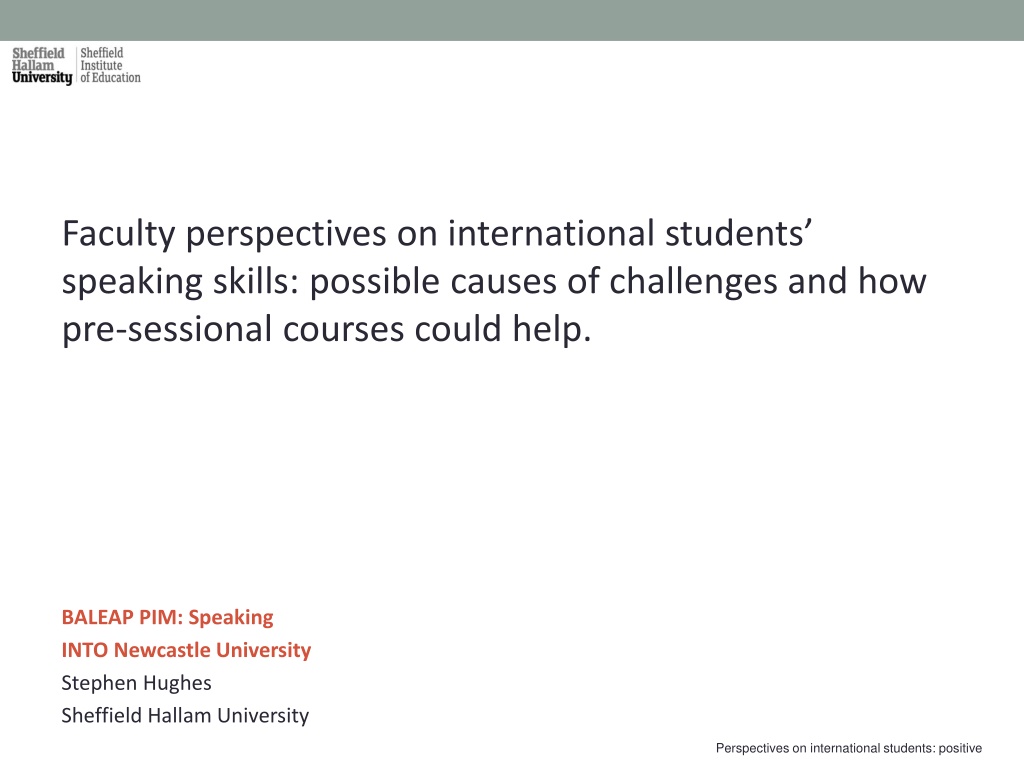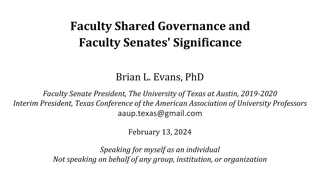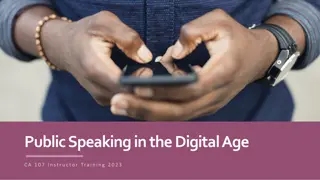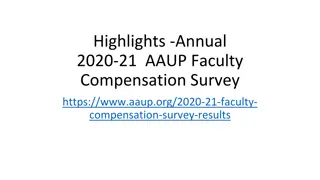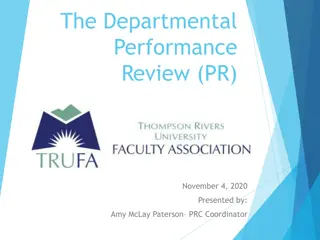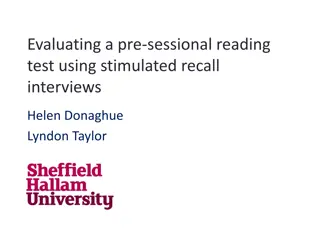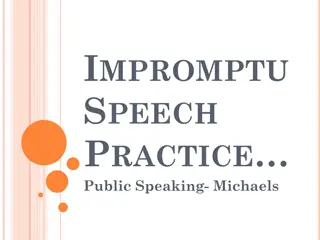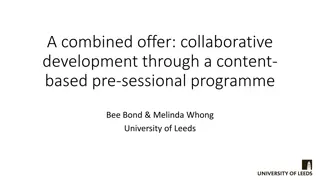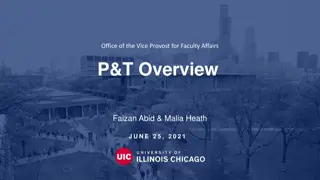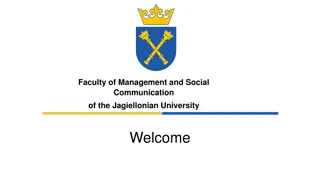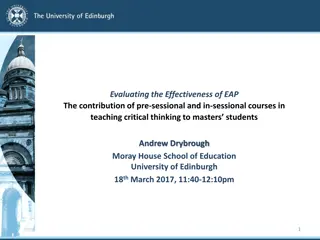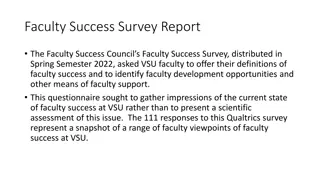Faculty Perspectives on International Students' Speaking Skills and Pre-sessional Course Impact
Faculty perspectives on international students highlight both positive aspects and challenges. Positive feedback includes enriching diversity and dedication of non-UK students. Challenges involve differences in expectations, language barriers, and cultural attitudes affecting communication and engagement. Areas like Chinese students' passive nature and Indian students' lack of confidence are identified. A qualitative methodology of semi-structured interviews was utilized to gather insights from various staff members across different academic disciplines and programs.
Download Presentation

Please find below an Image/Link to download the presentation.
The content on the website is provided AS IS for your information and personal use only. It may not be sold, licensed, or shared on other websites without obtaining consent from the author. Download presentation by click this link. If you encounter any issues during the download, it is possible that the publisher has removed the file from their server.
E N D
Presentation Transcript
Faculty perspectives on international students speaking skills: possible causes of challenges and how pre-sessional courses could help. BALEAP PIM: Speaking INTO Newcastle University Stephen Hughes Sheffield Hallam University Perspectives on international students: positive
Perspectives on international students positive 89%: enjoy working with non-UK postgraduate students / 70%: non-UK students beneficial overall. (Fallon and Brown, 1999, 46 respondents in 4 UK HEIs) ... cultural diversity of the student body adds to the richness of the teaching and learning experience.(Robson and Turner, 2007, 35 staff members 1 UK HEI) International students can add a fresh perspective. (Kingston and Forland, 2008, Academic staff and UG/PG students 1 UK HEI) ... more likely to attend classes, more hard working, disciplined and respectful when compared with home students. (Barron, Gourlay & Gannon Leary, 2010, Academic staff :86 questionnaires to academic staff from 2 post-92 UK universities Perspectives on international students: challenges
Perspectives on international students challenges 72%: different student expectations, 87% : problems of language, 54% : different attitudes to lecturer role. (Fallon and Brown, 1999), 46 respondents in 4 UK HEIs) Chinese students: passive, and reluctant to engage in critical thinking, argument and discussion / groups tend to stick together to the detriment of the development of interpersonal skills and cross cultural communication. (Robson and Turner ,2007, 35 staff members 1 UK HEI) ... less likely to question and enter into debate /rote learn/ more reliant on the lecturer. (Barron, Gourlay & Gannon Leary, 2010, Academic staff : 86 questionnaires to academic staff from 2 post-92 UK universities) Students: felt uncomfortable asking their tutors questions during a lecture/seminar (Kingston and Forland, 2008, Academic staff and UG/PG students 1 UK HEI) Student (Jordanian): No, it's a different culture ; student (Mexican): never question the views of an academic member of staff; student (Indian): I am a little more confident now, but not when I first came I was a little scared. (McDonald, 2014, International student perspective 1 UK HEI) Methodology
Qualitative approach: semi-structured interviews; pre-seen questions; all recorded and transcripts analysed for prominent themes / contacted fifty-one staff: eighteen respondents Methodology Business School 9 Development & Society MSc Accounting / BA Accounting for Business Studies / MSc Managing Global Business / BSc Finance / MSc Accountancy and Finance / MSc Financial Management / UG+PG Finance / UG Global Marketing / UG Hospitality / BA International Hotel Management / BA Marketing / BA Marketing Communications / BA Business + Marketing 3 MA TESOL / BSc Business Property Management (top up) Arts, Computing, Engineering and Sciences Health & Well Being 3 3 MSc Advancing Physiotherapy Practice / MSc Public Health / MSc Sports Business Management MA Contemporary Fine Art / BA Jewellery and Metalwork / UG+PG Critical Reflection / Theory Supporting Practice / MA Interior Design / MA Design Faculty expectations of students
Faculty expectations of students "One of my colleagues used to say listen to radio 4 or read the financial press". (UG/PG Finance) "... we have a weekly critical discussion about each student's work, and they take it in turns to lead a group of 25 throughout the semester." (PG Fine Art) "... people sat around ... everyone engaging in the dialogue, back and forth. What tends to happen is that people treat it as if they are in a queue and they are waiting to speak to the tutor. That's a challenge for us". (UG Jewellery and Metalwork) "...you will read this series of six critical texts over the course of the year, discuss them in the seminar ... it's assimilating test, responding to it, analysing it - you've got to be pretty fluent to do that". (UG/PG Art Supporting Theory module) Positive engagement in class
Positive engagement in class "At L6 last year, we had a group of students who presented to us - they were a country mile ahead of anyone else in the class - one of the best presentations I have seen full stop - 2 or 3 of them were top-up students and 2 were home students - confident, well practiced." (UG Hospitality Management) "You notice that at L5 their confidence is increasing and by L6 it is fantastic. Some are articulating points more clearly than UK students". (UG Business and Marketing) "I admire the hell out of these guys - I wouldn't do it in a million years. Presenting is nerve-wracking enough". (UG Hospitality Management) "This year - students contributing to really vibrant seminars - more vibrant than my UG seminars which are predominantly English speaking students". (PG Accounting + Finance) "Generally speaking skills are not a problem". (UG Business Property Management) Themes
Themes Reasons for not speaking Staff recommendations 1. Confidence 2. Expression of ideas 3. Understanding spoken words 4. Self-segregation 5. Previous learning styles 6. Engagement in class 7. Motivation 8. Discipline knowledge 9. Criticality / independent thinking 1. Interaction with other students 2. Interaction with tutors 3. Contact with academic departments 4. Link to discipline resources Reasons for not speaking 1: Confidence
Reasons for not speaking 1. Confidence "Confidence is the big issue at L4." (UG Business and Marketing) "The challenge often comes with confidence in speaking". (ACES PG Interior Design) "Very senior health practitioners just quake when they are asked to do a presentation in a classroom". (PG Public Health) "I could ask them basic questions on a 1-to-1 basis and you would see how they are struggling". (PG Accounting) "Some of them just lack confidence, which you can expect of any student". (UG Business Property Management) * "Some students, who could be just as brilliant as native UGs and know quite a lot, but cannot communicate it with the confidence they need are perceived by others that they are weaker". (PG Sports Business Management) "at L4 they may not feel comfortable with language, they skip classes, and then you're in a cycle of problems". (UG Hospitality Management) Reasons for not speaking 2: expression of ideas
Reasons for not speaking 2. Expression of ideas "... can't get your answer out quick enough. All the words are jumbled in your head". (PG Managing Global Business) "They just couldn't get their thoughts out. But you can't tell whether they haven't got the thoughts or whether they just can't express them". (PG Physiotherapy) " ... at level 6 there was 2 or 3 girls who would have done all the talking for about 15 people". (UG Hospitality Management) "You're already making a translation from the visual, to trying to describe it in language. And that's increased for students trying to describe it in a second language". (PG Fine Art) "If you are operating at a low level, it s almost impossible to put that joined abstract thinking together". (PG Accounting) Our study cannot provide a definitive answer, but it suggests that the threshold (for entry) should be set at, or above, a level equivalent to an Ielts score at 7.5 . (Trenkic in Tedeschi, 2018) Reasons for not speaking 2: expression of ideas (cont.)
Reasons for not speaking 2. Expression of ideas (cont.) "This particular student couldn't agree with the other person speaking their language, so this perhaps shows it was not a language problem". (PG Sports Business Management) "It wasn't about how he had been prepared, it was something in him from the very beginning that was a bit of a red flag ". (PG Physiotherapy) "He is quite isolated ... he's the only one. His English is really weak ... and we've been really quite concerned that he is quite isolated. (PG Fine Art) "... a gradual social isolation where he was stopping trying and he ended up avoiding coming into class". We do a lot of group working, but if they are not doing that in class and not taking part in the social chit chat, then they can become quite isolated". (PG Physiotherapy) The overall picture supports existing literature, which claims that international students experience a higher level of stress compared to domestic students". (Ng, 2006) Learning shock ... such unpleasant feelings are intensified and can impose a deeper psychological and emotional strain on learners that are crossing national and/or cultural borders. (Gu, 2005) Reasons for not speaking 3: understanding spoken words
Reasons for not speaking 3. Understanding spoken words "He didn't feel he could understand what the others were saying ... he couldn't move between the different accents". (PG Physiotherapy) "Students would meet me and get clarification and then go to another module tutor and get clarification from him - he's Greek, I'm Irish; we are going to express ourselves differently". (UG Hospitality Management) "... Chinese don't pick up on what you are saying. Anything beyond a direct instruction. (PG Accounting) "they would think in their own language and then translate it. It does impact, it can be incomprehensible". (PG Sports Business Management) "... exam procedures ... Even though I heard her say it three times before. They clearly had not understood that". (UG Business Property Management) Reasons for not speaking 4: self-segregation
Reasons for not speaking 4. Self-segregation "Only spend time with Chinese students speaking Mandarin". (PG Accounting) "They do oftensegregate". (UG Marketing Communications) " ...a little Pakistani cohort, and ... .a group of Arabic girls. I am worried they weren't integrating properly". (PG Physiotherapy) "... tend to be quite cliquey; It does impact on them as they are not getting that interaction". (UG Hospitality Management) "Theability to communicate deteriorated considerably ... by not mixing with other students". (PG Sports Business Management) "... verbal communications degrade ... because they always speak Chinese. The weaker students get quieter and quieter ". (UG Business Property Management) "other international students (Spain Poland Malaysia) are brought together by English. As a consequence their English language skills tend to improve". (UG/PG Finance) Reasons for not speaking 5: previous learning styles
Reasons for not speaking 5. Previous learning styles 1.7 Previous learning styles "There is a greater formality in the way they see education". (PG TESOL) "turn up, sit there and say fill me up with knowledge". (UG/PG Finance) Chinese students tend to be more conscious of not making a mistake. It tends to be a passive learning culture". (UG/PG Finance) "... nodding doesn't mean I understand, it means I'm politely going along with what you are saying". (PG Fine Art) "sometimes they just smile at me even if they haven't understood me at all".(PG Physiotherapy) "don't want to put their hands up and ask and say they don't understand". (UG Marketing Communications) *"... not encouraged to ask for support and are afraid to be stigmatised because of the hierarchal structure in other cultures". (PG Sports Business Management) "... don't tell the lecturer to slow down because they think it will be taken badly and it's disrespectful". (UG Business Property Management) Staff recommendations 1: interaction with other students
Staff recommendation 1: Interaction with other students 941 2 2 Chinese Arabic "Because the whole class is so international, it encourages English to be used". (UGMarketingCommunications) SE Asia 153 India Pakistan "Where group work is involved, we try to mix up the nationalities and the abilities at both levels ". (UG/PG Finance and Accountancy) "Get involved with Culture Connect. Get teamed up with another International student or an English student. (UG Business Property Management) "One of the things that we really need to encourage them to do is not just stick with Chinese students, go and sit with a person from a different country". (UG/PG Hotel Business Management) "Encouraging them to realise that when somebody's talking they should be listening, not waiting in a queue or texting on a phone. Maybe strategies for group conversation". (UG Jewellery and Metalwork) "Right from induction we are really clear that there is a lot of peer learning going on". (PG Fine Art) "Students should not be afraid to ask each other for help - go forward and learn together". (UG/PG Finance) Staff recommendations 2: interaction with tutors
Staff recommendation 2: Interaction with tutors "Educate the students that it is OK to say to the lecturer, can you please slow down, say that again." (UG Business Property Management) *"assure them that they can put up a hand in the middle of a class and say please can you repeat that word, explain that word or slow down a little, and we won't be offended and they won't be ashamed or shot or anything like that." (UG Hospitality Management) "Know it is OK to ask questions". (PG Managing Global Business) " ... be encouraged more to chat and put up their hand to ask more questions. I don t think any teachers would have an issue with this." (UG Marketing) "Get across the idea that tutors do like a discussion and do like to help and have a chat and it's nothing to be scared of." (UG/PG Finance and Accountancy) ** "Purposely say wrong words so they challenge the tutor and let them know it's perfectly culturally acceptable to do this". (PG Accounting) Staff recommendations 3: contact with academic departments
Staff recommendations 3: Contact with academic departments "Even if students do turn out to be a little bit weaker, you've made that connection with them already". (PG Sports Business Management) ". We would definitely like to meet them. Bring them over in the beginning of August. Tell them about the degree show in June - all the BA and MA work". (UG/PG Art Supporting Theory module) "I'm a little bit wary to meet them because of the resources - the job as course leader just gets bigger and bigger. It would be nice to meet them before induction - staff are all quite keen". (PG Physiotherapy) *"Any information on students helps the person teaching the student further down the line - it might take me four weeks to work out that one person is in a particular situation - it helps create a seamless transition". (UG/PG Global Marketing) Summary of changes to PS provision
Summary of changes to PS provision 1. Mixed discipline classes 2. Promote weekly sessions with the International Experience Team 3. Weekly individual student tutorials 4. Summative group seminar 5. Regular peer review of formative writing 6. Faculty meet and greet session 7. Faculty specific lecture input 8. Re-introduction of end-of-course progress report (?) References
References Barron, P., Gourlay, L.J. & Gannon Leary, P. (2010). International students in the higher education classroom: initial findings from staff at two post 92 universities in the UK. Journal of Further and Higher Education, 34, (4), 475-489, doi: 10.1080/0309877X.2010.512076 Fallon, G. & Berman Brown, R. (2006). What About the Workers? Academic staff opinions about working with non UK postgraduate students in higher education. Journal of Further and Higher Education, 23, (1), 41-52, doi: 10.1080/0309877990230104 Gu, Q. (2005). "Enjoy loneliness"- Understanding voices of "the" Chinese learner. Humanising Language Teaching,Year 7 (6),. Retrieved from http://www.hltmag.co.uk/nov05/index.htm. Kingston, E. & Forland, H. (2008). Bridging the Gap in Expectations Between International Students and Academic Staff. Journal of Studies in International Education ,12, (2), 204 - 221. doi: 10.1177/1028315307307654 McDonald, I. (2014). Supporting international students in UK higher education institutions. Perspectives: Policy and Practice in Higher Education, 18, (2), 62-65, doi: 10.1080/13603108.2014.909900 Ng, K. M. (2006). Counselor Educators Perceptions of and Experiences with International Students. International Journal of Advanced Counselling, 28 (1), 1-19. doi: 10.1007/s10447-005-8492-1 Robson, S. & Turner, Y. (2007). Teaching is a co-learning experience : academics reflecting on learning and teaching in an internationalized faculty. Teaching in Higher Education, 12, (1), 41-54, doi: 10.1080/13562510601102115 Tedeschi, F. (2018). High Ielts score beats ability in quest for academic results. Retrieved from http://digital.elgazette.com/june- 2018/research-news-high-ielts-score-beats-ability-in-quest-for-academic-results.html Trenkic, D. & Warmington. M (2018). Language and literacy skills of home and international university students: How different are they, and does it matter? Bilingualism: Language and Cognition, 1-17. doi:10.1017/S136672891700075X
